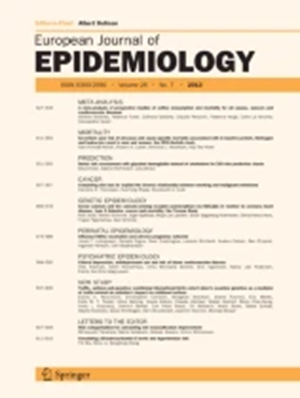Breast Cancer Information Grand Round for Survivorship (BIG-S) prospective cohort.
IF 5.9
1区 医学
Q1 PUBLIC, ENVIRONMENTAL & OCCUPATIONAL HEALTH
引用次数: 0
Abstract
Existing evidence indicates that long-term effects of breast cancer treatment can significantly impact survivors' ability to fulfill their personal, familial, and social roles. However, few studies comprehensively integrate patient-reported outcomes (PROs) and real-world healthcare utilization data, particularly in Asian populations. Thus, we established a prospective cohort, the Breast Cancer Information Grand Round for Survivorship (BIG-S), to address these gaps and introduce this resource. The prospective BIG-S cohort recruited patients newly diagnosed with breast cancer at Samsung Medical Center starting in November 2018. Clinical data, recurrence, and healthcare utilization were systematically collected from electronic medical records by trained researchers, and body composition was measured using multifrequency bioelectrical impedance analysis. PROs were assessed following recommendations from the International Consortium for Health Outcomes Measurement (ICHOM). These included health-related quality of life, physical, psychological, social, and cognitive functions, symptoms, healthy behaviors, financial difficulty, spiritual well-being, and cancer adaptation, using validated questionnaires. A total of 2,749 patients participated, with an average age of 49.7 years. The mean quality-of-life score at diagnosis was 55.6, indicating moderate general well-being, and improved gradually to 68.2 at four years post-diagnosis. At baseline, participants showed high physical, cognitive, and role functioning scores but had relatively lower emotional and social functioning scores. Over four years, emotional and social functioning improved, whereas cognitive and role functioning declined. Survivors initially reported low sexual functioning, sexual enjoyment, and future perspectives, all of which significantly decreased during follow-up. Fatigue and insomnia were persistent throughout the observation period. Healthcare utilization initially concentrated on plastic surgery and rehabilitation medicine and increasingly shifted towards gynecology, family medicine, and psychiatry after two years. The BIG-S cohort uniquely integrates clinical data, PROs, and healthcare utilization patterns, offering comprehensive insights into breast cancer survivorship trajectories. Findings from BIG-S are expected to guide targeted interventions and inform tailored survivorship care strategies, especially for Asian breast cancer survivors.乳腺癌生存信息大调查(BIG-S)前瞻性队列。
现有证据表明,乳腺癌治疗的长期影响可以显著影响幸存者履行其个人、家庭和社会角色的能力。然而,很少有研究全面整合患者报告的结果(PROs)和现实世界的医疗保健利用数据,特别是在亚洲人群中。因此,我们建立了一个前瞻性队列,乳腺癌生存信息大轮(BIG-S),以解决这些差距并引入这一资源。前瞻性BIG-S队列从2018年11月开始在三星首尔医院招募新诊断为乳腺癌的患者。由训练有素的研究人员系统地从电子病历中收集临床数据、复发和医疗保健利用情况,并使用多频生物电阻抗分析测量身体成分。根据国际健康结果测量联合会(ICHOM)的建议对PROs进行了评估。这些包括与健康相关的生活质量、身体、心理、社会和认知功能、症状、健康行为、经济困难、精神健康和癌症适应。共有2749例患者参与,平均年龄49.7岁。诊断时的平均生活质量评分为55.6,表明一般幸福感中等,并在诊断后四年逐渐提高到68.2。在基线时,参与者表现出较高的身体、认知和角色功能得分,但相对较低的情感和社会功能得分。四年后,他们的情感和社会功能有所改善,而认知和角色功能则有所下降。幸存者最初报告性功能低下、性享受和对未来的展望,所有这些在随访期间都显著下降。疲劳和失眠在整个观察期间持续存在。医疗保健利用最初集中在整形外科和康复医学,两年后逐渐转向妇科、家庭医学和精神病学。BIG-S队列独特地整合了临床数据、PROs和医疗保健利用模式,提供了对乳腺癌生存轨迹的全面见解。BIG-S的研究结果有望指导有针对性的干预措施,并为量身定制的幸存者护理策略提供信息,特别是对亚洲乳腺癌幸存者。
本文章由计算机程序翻译,如有差异,请以英文原文为准。
求助全文
约1分钟内获得全文
求助全文
来源期刊

European Journal of Epidemiology
医学-公共卫生、环境卫生与职业卫生
CiteScore
21.40
自引率
1.50%
发文量
109
审稿时长
6-12 weeks
期刊介绍:
The European Journal of Epidemiology, established in 1985, is a peer-reviewed publication that provides a platform for discussions on epidemiology in its broadest sense. It covers various aspects of epidemiologic research and statistical methods. The journal facilitates communication between researchers, educators, and practitioners in epidemiology, including those in clinical and community medicine. Contributions from diverse fields such as public health, preventive medicine, clinical medicine, health economics, and computational biology and data science, in relation to health and disease, are encouraged. While accepting submissions from all over the world, the journal particularly emphasizes European topics relevant to epidemiology. The published articles consist of empirical research findings, developments in methodology, and opinion pieces.
 求助内容:
求助内容: 应助结果提醒方式:
应助结果提醒方式:


